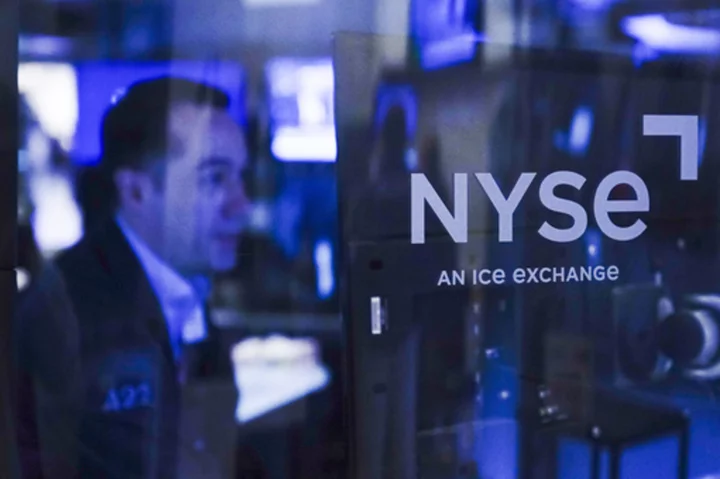NEW YORK (AP) — Wall Street is dipping in early trading, weighed down by a sharp drop for Disney and flaring fears about U.S. banks. The S&P 500 was off 0.4% early Thursday. The Dow fell 306 points, or 0.9%, while the Nasdaq composite gave back 0.2%. Disney dropped 8% after it said it lost 4 million streaming subscribers during the latest quarter. Some banks beaten down by the industry’s mini-panic were also under pressure. PacWest tumbled after disclosing a flight of deposits last week. Treasury yields fell after a report said inflation at the wholesale level was cooler than expected last month.
THIS IS A BREAKING NEWS UPDATE. AP’s earlier story follows below.
Wall Street edged lower in premarket trading Thursday ahead of the U.S. government's second release of data on inflation in two days.
Futures for the Dow Jones industrials fell 0.3%, while the S&P 500 slipped less than 0.1% before the bell.
On Wednesday, most major U.S. indices finished higher after new data suggested inflation in the United States was cooling, though it remains uncomfortably high. A report on inflation at the wholesale level arrives Thursday, along with the weekly jobless claims data.
Traders upped the probability they see of the Fed holding rates steady in June to nearly 94%, according to data from CME Group.
The Fed has jacked up rates at a furious pace in hopes of driving down inflation. But high rates do that by slowing the entire economy and hitting investment prices broadly. They’ve already sent stock prices tumbling, caused turmoil in the banking system and dragged on the economy enough that many investors expect a recession to hit this year.
The Walt Disney Co. tumbled more than 5% in off-hours trading after the entertainment giant said it lost 4 million subscribers to its Disney+ streaming service.
The Biden administration is proposing new limits on greenhouse gas emissions from coal- and gas-fired power plants, its most ambitious effort yet to roll back planet-warming pollution from the nation’s second-largest contributor to climate change. The announcement did not appear to have a sizeable effect on the nation's largest power companies.
Inflation in the U.S. still remains way above the Fed’s 2% target and continues to squeeze households across the economy, particularly those with the lowest incomes.
The majority of companies in the S&P 500 have topped profit forecasts so far this reporting season, which is approaching its final stretch. But they’re still on pace to report an overall drop in earnings from a year earlier, which would be the second straight quarter that’s happened.
Besides worries about interest rates and inflation, some corners of the bond market are also swinging on concerns about the U.S. government inching closer to a possible default on its debt. That’s never happened before, and economists warn a default could be catastrophic for the economy and financial markets.
At midday in Europe France's CAC 40 gained 0.3%, while Germany's DAX ticked down 0.2%.
Britain's FTSE 100 slid 0.4% after the Bank of England on Thursday raised interest rates to their highest level since late 2008 as it continues to combat stubbornly high inflation in the U.K.
In a widely anticipated move, the bank's Monetary Policy Committee lifted its main interest rate by a quarter of a percentage point to 4.5%. The increase was its 12th in a row.
Japan's benchmark Nikkei 225 finished little changed, inching up less than 0.1% at 29,126.72. Australia's S&P/ASX 200 slipped less than 0.1% to 7,251.90. South Korea's Kospi sank 0.2% to 2,491.00. Hong Kong's Hang Seng lost nearly 0.1% to 19,743.79, while the Shanghai Composite fell 0.3% to 3,309.55.
Concerns about the Chinese economy remain a major focus, especially for the Asian region, with the latest cause for worry coming from trade data released Tuesday. China's imports shrank at a faster pace, slumping 7.9%. Trade with the U.S. and European Union showed a contraction from last year.
“China could be heading into a deflationary funk similar to the one that Japan is starting to emerge from,” said Stephen Innes, managing partner at SPI Asset Management.
In energy trading, benchmark U.S. crude slipped 9 cents to $72.47 a barrel. Brent crude, the international standard, ticked down 2 cents to $76.39 a barrel.
In currency trading, the U.S. dollar edged down to 134.23 Japanese yen from 134.28 yen. The euro cost $1.0936, down from $1.0984.
___
Kageyama reported from Tokyo; Ott reported from Silver Spring, Md.

